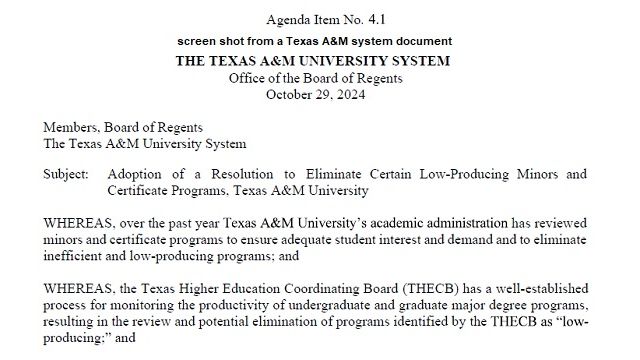
The Texas A&M system board of regents unanimously adopts a resolution that moves ahead with the flagship campus eliminating 52 low enrollment minor degree and certificate programs.
The resolution also directs all system universities to “promptly initiate a review of minors and certificate programs to identify any low-producing programs that may require elimination.”
The regents vote followed comments from eight Texas A&M faculty members who were opposed to the resolution, in part because they disagree with the regents belief that there was faculty input in the review process.
The regents academic affairs committee unanimously recommended approving the resolution. Committee chairman Michael Plank of Houston told opponents that had the full board agreed to pause the vote to do a second review as requested by A&M’s president, the regents in the end would have approved the resolution.
Regents vice-chairman Bob Albritton of Fort Worth, also responding to opponents, said their decision would not jeopardize A&M’s accreditation.
Click below to hear comments from public speakers and board of regents members Bob Albritton and Michael Plank:
Original story, November 5, 2024:
Business at Thursday’s Texas A&M system board of regents meeting (November 7) includes moving ahead with the flagship campus eliminating 52 low enrollment minor degree and certificate programs.
In October, A&M’s chief academic officer was criticized by the faculty senate for not including members before making his decision.
After that, A&M’s president called for restarting the process, using the faculty senate, to determine the fate of 14 minors and 38 certificate programs.
The regents agenda includes a resolution to move ahead with the provost’s decision, which was made following input from deans, department heads, and other faculty.
The resolution also calls on presidents at other system universities to “promptly initiate a review of minors and certificate programs to identify any low-producing programs that may require elimination.”
Attached to the resolution, are 11 pages of low producing minor degree and certificate programs at the flagship that are recommended to remain, become inactive, or be eliminated.
The resolution will be considered following a meeting of the regents academic affairs committee. The committee’s agenda includes discussing the proposed resolution and receiving a presentation about low producing minors and certificate programs.
